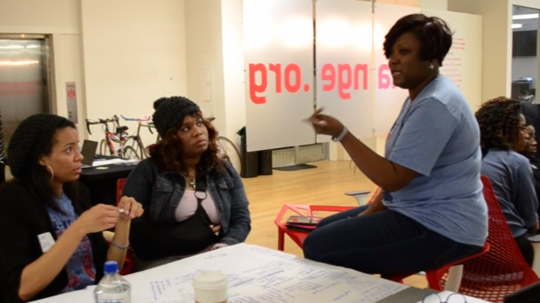

Teresa Hodge understands how difficult it can be to put your life back on track after serving time in prison after several years incarcerated herself. The experience inspired her and her daughter Laurin to create Mission: Launch, a startup aimed at helping former prisoners succeed once they leave prison. Their efforts have earned them a $50,000 prize from the U.S. Small Business Administration to start Mission: Launchpad a business accelerator for former prisoners seeking to become entrepreneurs.
Finding a job and stable lifestyle is statistically very difficult to accomplish for former prison inmates, with more than two-thirds of former inmates sent back to prison just three years after they are released, Teresa said. Doors of opportunity are often locked for people with a prison record, which makes entrepreneurship a useful alternative for a career. But returning citizens might not know how to take their idea for a business and make it a reality, and the Hodges have convinced the SBA that their idea for an accelerator could address that issue.
"We articulated a real need at the right time," Laurin Hodge said. "It was serendipitous, but it's all coming together."
Mission: Launch is based out of Impact Hub DC, a co-working space specifically for people working on social good projects. It's hosted hackathons and worked on projects related to helping people returning home from prison, including online tools for finding jobs through its leading role in the Rebuilding Re-entry Coalition. The accelerator fits into the Hodges' larger goals of leveraging technology for the benefit of people returning from prison and their families. The three-month program will include group lessons and discussion on how to start a business along with more one-on-one mentoring on creating the specific business model and the pitch to get it funded and launched.
The SBA money is marked specifically for operations, which Laurin said is good because funding for operations can be hard to find. Winning the grant meant more than just $50,000 too, as Mission: Launch has secured matching funding from four foundations and companies, turning it instantly into $250,000 total. As the accelerator won't be making money, grants and impact investments are going to be vital for its success. The SBA money is helping speed up the enrollment of the first cohort, which could begin as soon as late this year, although Laurin said that the first half of 2016 was more likely.
"It's a population that's different from what you might see at Y-Combinator"
The 12 to 15 people chosen for the first group will be a mix of people looking to start a tech business and those planning more of a lifestyle business related to industries like hospitality and landscaping. As the program grows it could split into two different tracks, but Laurin said that separating the two types isn't a priority just yet.
"In the beginning it's about finding the right people with the aptitude for entrepreneurship," Laurin said. "We have to be mindful of the community we serve."
"We've already identified a few members of our first cohort," Teresa added. "Our partners help identify who would be a good fit. It's a population that's different from what you might see at Y-Combinator."
The accelerator will be using that and other local co-working spaces such as Cove to host the classes and events. The startup also has plans to work with local universities like Johns Hopkins University and the University of the District of Columbia.
"We're excited about the partnerships we have," Laurin said. "And we see plenty more coming in the future."
"We're bridging the gap between social justice and technology."
There are already plans in the works to get angel investment and other impact investing in Mission: Launch. In a few years, the Hodges said they want to expand the accelerator to other cities, using the D.C. and Baltimore area as models for the rest of the country. A virtual platform for the accelerator is another tactic they want to pursue, working with their growing list of friends in the tech community to give the people looking to restart their lives after prison every advanced tool that can make it happen.
"We're bridging the gap between social justice and technology," Laurin said.




